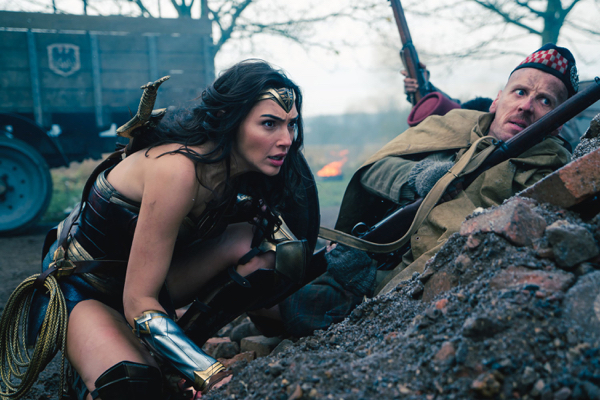Movie review by Greg Carlson
Since 1941, Wonder Woman has been so many things to so many people that the decidedly mixed bag of her long-delayed big screen headliner comes as little surprise. Directed by Patty Jenkins following a disheartening gap of years since 2003’s “Monster,” “Wonder Woman” at least makes good on its promise to expand the long(ish) term prospects of the DC cinematic universe. And no true fan will root against the sorely needed step in the direction of gender-based superhero egalitarianism at the multiplex. But the film’s screenplay, by comic book and television veteran Allan Heinberg, fails to sustain the excitement generated by the promising opening acts, relying for the umpteenth time on a by-the-playbook climax confrontation that we’ve all seen over and over again.
As the Amazonian demigoddess brought to life from sculpted clay (and later reimagined as the daughter of Zeus), Gal Gadot successfully navigates the considerable challenges required of the tiara. Wringing pathos, strength, and humor from dialogue that capitalizes on Diana’s fish-out-of-water status in World War I-ravaged Europe, Gadot consistently balances on the tightrope that affords her the classical knowledge of the ages — she is fluent in hundreds of languages and displays a commanding grasp of the detailed biological and physical components of human sexual intercourse — but renders her a babe in the woods when it comes to the magic of ice cream and the politics of war.
As detailed in Jill Lepore’s indispensable “The Secret History of Wonder Woman,” the character’s creation by William Moulton Marston is a saga as farfetched as any of the adventures contained within the pages of All Star and Sensation Comics. Diana’s accoutrements, from kinky boots to bulletproof wrist cuffs, hint at the erotic inclinations of Marston’s devotion to a matriarchal philosophy of female-led domination and submission. And despite a lighter tone than other recent DC properties overseen by Zack and Deborah Snyder, Jenkins unsurprisingly scrubs out camp and kitsch, notwithstanding the tantalizing prospects of the Lasso of Truth applied to a reluctant Steve Trevor (Chris Pine) and the presence of Lucy Davis’ delightful but underused Etta Candy.
With the exception of Diana’s progressive attitudes about no-strings-attached sex with Steve, Jenkins gravitates to the ass-kicking bona fides that elevate Wonder Woman to the top tier of the Justice League (and/or Super Friends, depending on your flavor). The set pieces that visualize her combat abilities, including a swords, spears, and arrows-versus-guns shoreline skirmish on Themyscira/Paradise Island and a one-woman advance through the “No Man’s Land” of the Belgian front lines, provide the movie’s deepest emotional satisfaction, a feat not quite duplicated with Diana and Steve’s abbreviated romance/friendship or the diluted soup of too many villains and, as Sheri Linden observed, a “one-on-one showdown that turns into an endless conflagration [that] grows less coherent as it proceeds.”
The demands of the massively budgeted studio franchise entry leave little wiggle room for experimentation, but I am not the only one who would have been interested in a more intimate and shorter experience either confined to the “utopian gynocracy” (as Dana Stevens puts it) of Themyscira or a deeper exploration of the Diana Does London chapter. What kind and size of role will Wonder Woman play when she lines up next to the males that form the rest of the JLA? Hopefully, something worthy of her status in the pantheon. The outlook for her solo efforts is more promising, even if those films never take full advantage of the period prospects of Diana’s centuries-spanning longevity. Either way, things are a lot more exhilarating when she’s around.
